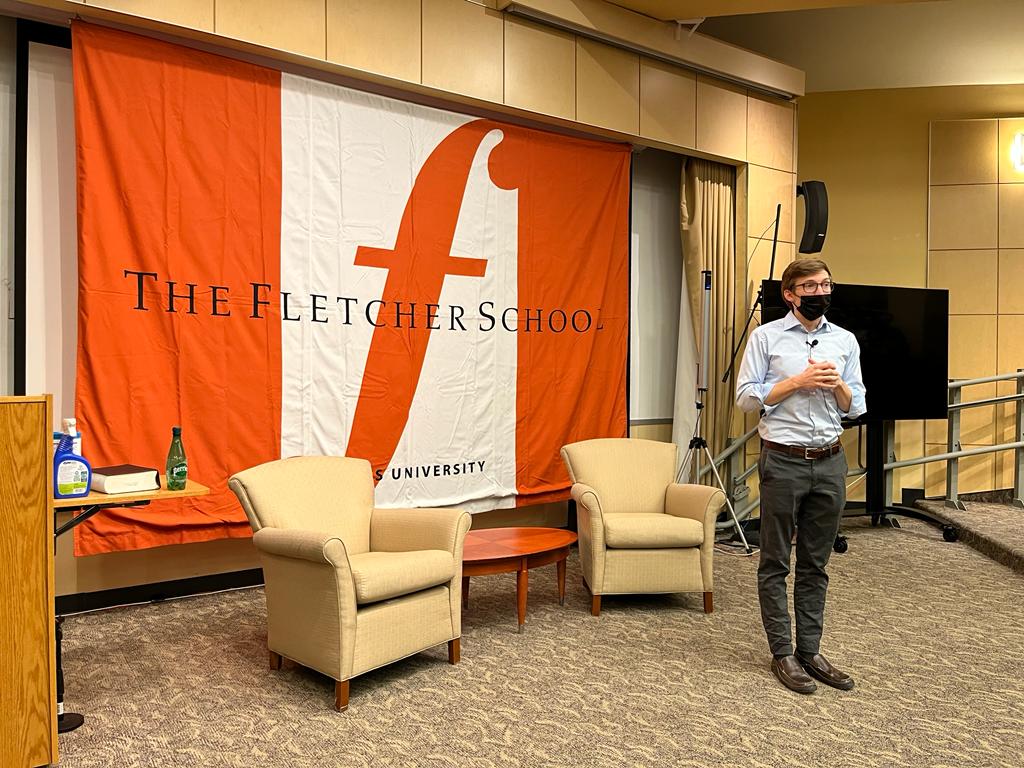
Understanding Russia’s end-game in Ukraine Invasion
By Vishal Manve, MALD 2023, The Fletcher School
To counter the ongoing Russian invasion of Ukraine and the latest attack on Europe’s largest nuclear power plant in Zaporizhzhia facility, the West announced several key steps — increased global and U.S. sanctions on Russia and Germany’s reversal of historic policy to never send weapons to conflict zones and the eventual imminent transfer of weapons to Ukraine.
To explain the historical contours of the ongoing conflict, its post-cold war genesis, and Russian President Vladimir Putin’s end-game, Christopher Miller, Assistant Professor of International History at The Fletcher School and Co-Director of the Russia and Eurasia Program led a masterclass on February 28, 2022 with over 250 Fletcher and Tufts students in attendance.
Through recorded messages and 5000-word blogs, Russian President Vladimir Putin has repeatedly made arguments about the “historical unity of Russians and Ukrainians”, and claimed both Russians and Ukrainians are “one people,” before commencing a military invasion in Ukraine in late February.
“It’s totally obvious what the Kremlin wants through the war because President Putin has said it repeatedly; He wants the neutralisation and demilitarisation of Ukraine, and Ukraine cannot have a potential military anymore,” Professor Miller explained.
Ukrainian President Volodymyr Zelenskyy is Jewish and won democratic elections in 2019, beating incumbent Petro Poroshenko.
“He [Putin] wants the denazification of Ukraine, which makes it a little bit more confusing as Ukraine has a Jewish president, but the fact is Russia wants a regime change in Kyiv,” Miller added.

Retracing the origins of the Russia-Ukraine conflict, Professor Miller highlighted 1991 as a historical pivot after the collapse of the Soviet Union, stemming from the independence of the Baltic States, Central Asian countries, and the intertwined history of Russia and Ukraine’s relationship.
“When the Soviet Union collapsed in 1991, the debate (around Russian borders) reemerged as a live political question. Previously, under the Soviet Union, everyone could have been a Russian, Uzbek or Ukrainian, but the primary identity was that you were a Soviet citizen,” Professor Miller explained.
He further highlighted how both Russian and Ukrainian nation-building shaped geopolitical conflicts as national identities took center stage between the two states in a post-Soviet space.
On the security front, 1991 was significant, Professor Miller explained, due to the restructuring of the European security architecture through the Organisation for Security Cooperation in Europe (OSCE). It granted equal member status to every member nation, irrespective of geographical, economic, or political power.
“There were some countries that were more influential than others and some countries that had more power than others. And although Russia was a big country with a large population and important history, Russia wasn’t treated as one of the most important numbers. And many Russians were dissatisfied with what they saw as the insufficient status that they were given in the European security architecture,” Miller further illustrated.
As Europe’s geopolitical clout increased, Russia struggled with dwindling Eurasian importance and the historical baggage of being a former Empire.
“…Russia is not simply a nation. It has been an empire, which was something that many Russians were not really willing to completely give up. So the idea of Russia being a normal country (in the EU) was a really hard sell,” Miller stated.
Additionally, as the Western influence in the Baltic and Central Asia increased, Russia felt threatened with its sphere of influence shrinking.
The conundrum resulted in Russia choosing to “construct an alternative world that was modeled off of the European Union” and launching multiple initiatives to reintegrate members of the former Soviet Union.
Professor Miller further explained the low impact of cyber warfare from Russia as the Kremlin’s planning failure, and President Joe Biden’s ‘information declassification’ that offered vital clues about Russia’s troop buildup and imminent attack on Ukraine.
“The reason we are in the midst of a war for territory in the center of Europe is that you have a country coming to grips with the fact that it lost its empire,” Professor Miller concluded.
